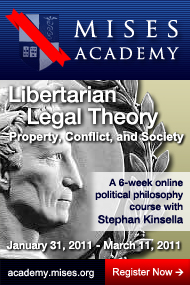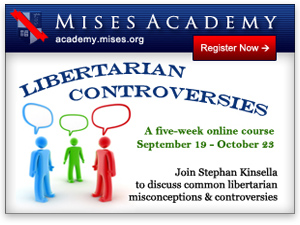Kinsella’s “Libertarian Legal Theory” Course: Audio and Slides
(Austrian) Economics, Anti-Statism, Education, Libertarian Theory, Statism
Last year I presented a 6 week Mises Academy course, “Libertarian Legal Theory: Property, Conflict, and Society,” discussed in my Mises Daily article “Introduction to Libertarian Legal Theory.”1 This course followed on the heels of my previous Mises Academy course, “Rethinking Intellectual Property: History, Theory, and Economics” (audio and slides), about which one student wrote me at the completion of the course,
Thank you so very much for all the excellent work — very few classes have really changed my life dramatically, actually only 3 have, and all 3 were classes I took at the Mises Academy, starting with Rethinking Intellectual Property (PP350) (the other two were EH476 (Bubbles), and PP900 (Private Defense)). …
My purposes for taking the classes are: 1. just for the fun of it, 2. learning & self-education, and 3. to understand what is happening with some degree of clarity so I can eventually start being part of the solution where I live — or at least stop being part of the problem.
The IP class was a total blast — finally (finally) sound reasoning. All the (three) classes I took dramatically changed the way I see the world. I’m still digesting it all, to tell the truth. Very few events in my life have managed to make me feel like I wished I was 15 all over again. Thank you. …
[M]uch respect and admiration for all the great work done by all the members of the whole team.
For more student feedback on Rethinking IP, see Kinsella’s Rethinking Intellectual Property course: Audio and Slides. The Libertarian Legal Theory course also received very positive comments and reviews.
(Student reaction to the first lecture of the Libertarian Legal Theory course can be found in Student Comments for First Lecture of Libertarian Legal Theory Course: Not Too Late to Sign Up!)
The students also evidently really enjoyed the lecture. Here are some of the comments from the chat session, near the end of the lecture (unedited except I have removed surnames):
[Mon 31 Jan 2011 10:12:25 PM EST] Patrick : This is excellent, best Mises class yet
[Mon 31 Jan 2011 10:46:52 PM EST] Karl : ok, thanks, nice class
[Mon 31 Jan 2011 10:47:01 PM EST] Jock : very good
[Mon 31 Jan 2011 10:47:40 PM EST] Robert : thanks for the lecture, it was great! see you guys next time
[Mon 31 Jan 2011 10:54:05 PM EST] Kevin : awesome – thanks!
[Mon 31 Jan 2011 10:54:17 PM EST] Amanda : Thanks for a wonderful class. Good night!
[Mon 31 Jan 2011 10:54:38 PM EST] Daniel: Thank you!
[Mon 31 Jan 2011 10:54:41 PM EST] Roger: Terrific class, thanks!
[Mon 31 Jan 2011 10:54:42 PM EST] Patrick : thank you
[Mon 31 Jan 2011 10:54:42 PM EST] Steven: Great lecture. Thanks
[Mon 31 Jan 2011 10:54:43 PM EST] George: Great class ‘night
[Mon 31 Jan 2011 10:54:44 PM EST] Mark: Very good class. Thanks!
[Mon 31 Jan 2011 10:54:45 PM EST] Cheryl: Thanks!
[Mon 31 Jan 2011 10:54:46 PM EST] Danny Sanchez : Thanks for attending everyone!
[Mon 31 Jan 2011 10:54:46 PM EST] safariman : Good class! Thanks
[Mon 31 Jan 2011 10:54:48 PM EST] Patti : thanks. bye
[Mon 31 Jan 2011 10:54:50 PM EST] Jonathan: Thanks!
[Mon 31 Jan 2011 10:54:51 PM EST] Colin: Thanks.
[Mon 31 Jan 2011 10:54:52 PM EST] Thomas : Thank You!
[Mon 31 Jan 2011 10:54:56 PM EST] Erika : Thank you!
[Mon 31 Jan 2011 10:54:56 PM EST] Danny Sanchez : thanks for the great lecture Stephan!
[Mon 31 Jan 2011 10:55:02 PM EST] Derrick : Thanks
[Mon 31 Jan 2011 10:55:14 PM EST] Robert: thx
[Mon 31 Jan 2011 10:55:29 PM EST] Noam: Thanks a lot!
[Mon 31 Jan 2011 10:55:29 PM EST] Robert: GREAT first lecture
[Mon 31 Jan 2011 10:55:33 PM EST] Matthew : Great lecture thanks
[Mon 31 Jan 2011 10:55:54 PM EST] Matt Gilliland : Thanks so much! Best Christmas present I’ve ever gotten, I think.
This echoed the type of comments students provided in real-time in the Rethinking IP course, in comments such as the following at the end of the lectures (these are from the actual IP-lecture chat transcripts):
- “Thank you, great lecture!”
- “Thanks, excellent lecture.”
- “Great job.”
- “Great lecture!”
- “Thank you, Sir. Great lecture!”
- “Thanks for an excellent talk.”
Now, that is very gratifying to a teacher. It’s immediate feedback. And it’s a good example of what I mentioned in “Teaching an Online Mises Academy Course”:
These heartfelt and spontaneous comments reminded me a bit of times past, when students would applaud at the end of a good lecture by a professor. In this sense, and contrary to what you might expect with the coarsening of manners and the increase of informality in typical Internet fora, for some reason the new, high-tech environment created by Mises Academy seems to foster a return to Old World manners and civility — which is very Misesian indeed! Perhaps it is because these students are all 100 percent voluntary, and they want to learn. They are much like students decades ago, who were grateful to get into college — before state subsidies of education and the entitlement mentality set in, turning universities into playgrounds for spoiled children who often skip the classes, paid for 10 percent by parents and 90 percent by the taxpayer.
The audio and slides for all six lectures of the Libertarian Legal Theory course are provided below. The “suggested readings” for each lecture are appended to the end of this post.
Update: the audio files may also be subscribed to in this podcast feed.
LECTURE 1: LIBERTARIAN BASICS: RIGHTS AND LAW
LECTURE 2: LIBERTARIAN BASICS: RIGHTS AND LAW (continued) …
Kinsella’s “Libertarian Legal Theory” Course: Audio and SlidesRead More »
See also Danny Sanchez’s post Study Libertarian Legal Theory Online with Stephan Kinsella. ↩
Kinsella’s “Libertarian Legal Theory” Course: Audio and Slides Read Post »



